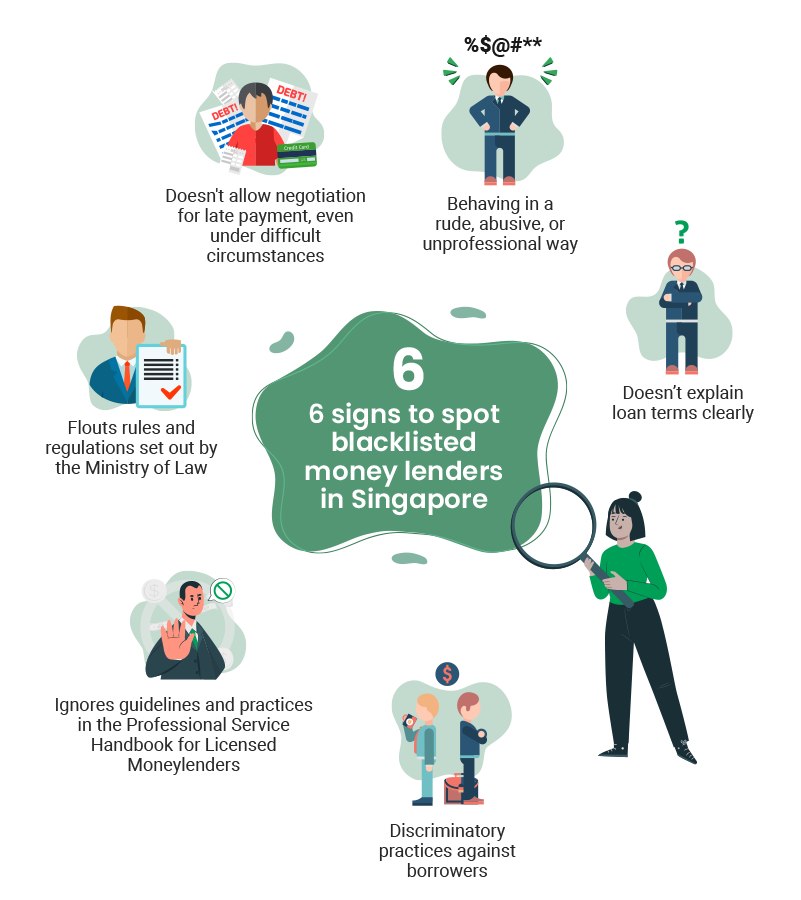Borrowing from blacklisted money lenders is never a good idea, no matter how urgent your financial needs are. These money lenders conduct their operations outside of the law and have lost their licence for failing to adhere to the rules and regulations laid down by the law.
This article takes a look at the differences between a licensed money lender in Singapore and one that is blacklisted, the dangers of borrowing from a blacklisted money lender, and how you can spot and avoid them.
Who are blacklisted money lenders in Singapore?
Blacklisted money lenders are licensed lenders who have flouted the rules set out under the Moneylenders Act. Due to the serious nature of their offences, these money lenders had their licence suspended or revoked.
Suspended or blacklisted money lenders will be named in the Registry of Moneylender’s official list of licensed lenders, clearly marked as such at the bottom of the list.
Additionally, a licensed lender that consistently engages in unfair or unscrupulous practices against borrowers may also earn a bad reputation, causing them to be blacklisted by the community.
Note that although such money lenders may still have their licence (perhaps because they are still under investigation) they nevertheless should be avoided to save yourself from an unpleasant encounter.
Licensed money lender vs blacklisted money lender
| Licensed money lender | Blacklisted money lender |
| Behaves professionally and courteously at all times | Rude and unprofessional behaviour towards customers (including not answering calls, not replying to text messages, etc) |
| Explains loan terms, fees, terms and conditions clearly, and is open to negotiation when borrowers genuinely need help | Doesn’t explain loan terms clearly to borrowers, and doesn’t allow negotiation on late payment, even under difficult circumstances |
| Adheres to the Ministry of Law’s rules and regulations, guidelines and practices in the Professional Service Handbook for Moneylenders | Doesn’t follow the Ministry of Law’s rules and regulations, and ignores guidelines and practices in the Professional Service Handbook for Moneylenders |
| Does not discriminate against any borrowers | Practises discrimination against certain borrowers |
In understanding the differences between licensed lenders and blacklisted or illegal ones, there are four areas to pay attention to:
- Advertisement channels
- Loan amount, contract, and receipts
- Terms and conditions of the loan
- Behaviour, practices, and feedback from the public
Advertisement channels
One telltale sign you may be dealing with a blacklisted money lender is the channel through which they advertise.
Under the law, licensed lenders are only allowed to advertise through specific channels — business or consumer directories (both print or online); websites owned by the money lenders; and advertisements at the money lenders’ business premises. All other advertisement channels are not allowed.
As such, if you receive a loan offer through flyers, emails, SMSes, and phone calls, or see money lender advertisements on social media platforms like Facebook, Instagram, etc, it is highly likely you’re dealing with an unlicensed money lender.
One exception is a third-party loan comparison service, which assists you in getting quotes from different money lenders to find the one with the best terms. Note that these services are not money lenders and thus you may encounter their advertisements on social media and other channels.
Limits to the loan amount
The Singapore government has set debt limits in place to help borrowers avoid taking on too much debt. How much you can borrow from licensed money lenders depends on your annual income, as follows:
- Annual income S$20,000 and above: Borrow up to 6x monthly income
- Annual income between S$10,000 and S$20,000: Borrow up to S$3,000
- Annual income less than S$10,000: Borrow up to S$3,000 (Citizen or PR) or S$500 (Foreigner)
Blacklisted money lenders are likely to ignore these loan limits and let you borrow as much as you want. On the surface, this may appear to be a good thing, but their intention isn’t to help you. Rather, the more you borrow, the more money they can make off you.
Hence, if you come across a loan offer that is higher than the legal limits, be wary of accepting the offer. You are most likely dealing with an illegal money lender, potentially exposing yourself to the dangers of loan shark harassment.
Clear and transparent terms and charges
Besides borrowing limits, licensed lenders also have to adhere to limits on fees and charges, and communicate them transparently and clearly to borrowers. Specifically, legal lenders may only charge the below fees:
- Up to 4% per month interest
- Up to 10% of the loan’s principal amount as admin fee after a loan is granted
- Up to S$60 late fee
- Up to 4% per month late interest on the overdue amount
- Legal fees ordered by the court for successful recovery of the loan
Note that in total, interest, late interest, admin fee, and late fee cannot exceed an amount equal to the loan’s principal sum.
For the protection of borrowers, these fees, along with all other terms and conditions on the loan, should be clearly stated in an official loan contract. Monthly repayments made should also be duly recorded and a receipt should be issued for each repayment.
Blacklisted money lenders are unlikely to adhere to these caps. They may charge interest higher than 4% per month or impose hefty admin charges and late fees. Some blacklisted money lenders may even hide these fees from you, making you pay much more than you initially thought.
Another warning sign is the absence of a clear and detailed loan contract or not receiving receipts for your repayments. The aim of withholding these documents from you is to discourage you from seeking help from the authorities, making you feel you have no evidence against them.
Behaviour, practices, and feedback from the public
Another area to pay attention to is the behaviour and practices of the money lender. From deliberately ignoring your phone calls or messages, to rude, bullying, abusive language or actions, tactics that make you feel intimidated or unsafe indicate you could be dealing with a blacklisted money lender.
Also, beware of unlawful practices such as the withholding of your identity card and personal documents, asking you to sign a blank contract, not explaining the loan terms and conditions clearly, or asking for your Singpass and other sensitive information.
And while this may be somewhat subjective, if a money lender consistently refuses to renegotiate on late payments for a borrower genuinely facing difficult circumstances, it could be a warning sign. Or worse yet, when a borrower is unable to pay a money lender and resorts to harassment and violence.
One useful way to screen out potentially blacklisted money lenders is by checking public feedback, such as Google reviews, or comments left on social media pages. If you see a consistent pattern of problematic behaviour or complaints, it may be best to avoid the lender altogether.
It may also be useful to familiarise yourself with the Ministry of Law’s rules and regulations, as well as the guidelines and standards in the Professional Service Handbook so you know what to expect.
How to identify blacklisted money lenders
Now that we understand the differences between licensed lenders and blacklisted money lenders, we can see that there are six signs we can use to help spot and avoid the latter.
How to check if you’re dealing with a licensed lender
The moneylending sector is closely monitored by the authorities and the Ministry of Law maintains a record of licensed lenders in Singapore in good standing. Any money lenders that run afoul of the law will have their licence suspended or even revoked, and be blacklisted.
At the time of writing, no licensed money lender has been suspended. Any suspended money lenders will be indicated as such on the last page of the list. If the money lender you are borrowing from cannot be found on the official list, do not proceed.
Lastly, if you suspect you are dealing with a blacklisted money lender, contact the Ministry of Law at telephone number: 1800-2255-529. You may also call this number to report any unauthorised advertisements such as flyers, SMSes, or phone calls from money lenders.
Elite Investment & Credit is a fully licensed Geylang money lender that’s in good standing and 100% committed to serving our customers professionally and lawfully. Contact us today to find out about our low-interest loan packages. If you’re all set and ready to get a loan, simply submit a loan application through the traditional form method or via Singpass!
About the Author

Jasbir Kaur
No fuss, No stress. You can count on me to get the facts right.


